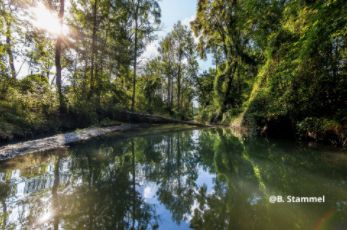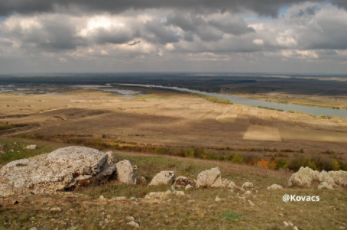How Floodplains Clean The Water Of The Danube: New Project For The Danube Basin
How do floodplain areas along the Danube contribute to improving water quality, and how can diverse interests be taken into account in their transboundary management? These questions are being addressed by a consortium funded by the European Union in the IDES - Improving water quality in the Danube River and its Tributaries by Integrative Floodplain Management Based on Ecosystem Services Project under the leadership of Catholic University (Eichstaett-Ingolstadt, Germany).
Ecosystem services are the many and varied benefits to humans gifted by the natural environment and from healthy ecosystems. These ecosystems, functioning in healthy relationship, offer such things like natural pollination of crops, clean air, extreme weather mitigation such as drought and floods, human mental and physical well-being.

IDES aims to develop and implement a transnational integrative ecosystem service approach to improve water quality management and thus, generating win-win-situations for multifunctional floodplains instead of trade-offs. The IDES tool should enable the national key actors in water quality management to identify the most sustainable measures without neglecting the needs of other sectors. The innovative IDES tool will provide an ecosystem service assessment for floodplains that supports sustainable decision-making in floodplain management both in pilot areas and at the transnational level.
From its source to its mouth in the Black Sea, the Danube covers a distance of more than 2,800 kilometres, flows through ten countries, and gets its water from 20 different countries along the way. More than 80 million people live in the catchment area of the river, and - just like flora and fauna - are dependent on good water quality.
"The flow of nutrients in water does not stop at national borders. That is why it is our concern to jointly establish strategies for comprehensive water quality management with this international project. The floodplains along the Danube play a key role in this, as they are able to retain nutrients," explains Prof. Dr. Bernd Cyffka, head of the Floodplain Institute at Catholic University of Eichstaett-Ingolstadt.
Floodplains have many roles and tasks
Rivers and their floodplains have many roles and tasks: they serve as shipping routes and recreational areas, protection against floods, drinking water reservoirs, and as habitats for plants and animals.

"The aim of the IDES is to adopt a comprehensive perspective that takes this important aspect into consideration for the first time. The participating researchers are focusing on five pilot regions in Austria (Danube River), Romania (Braila Island), Serbia (Danube River), Slovenia (Mura River) and Hungary (Tisza River). We seek to develop an integrated concept for the management of floodplains in these regions in close collaboration with decision-makers. Diverse and mutual ecosystem services of floodplains will become more transparent and become the basis for future handling of such areas." – says the research assistant, Dr. Barbara Stammel.
During the two-and-a-half-year implementation period, the innovative actions will focus on the following:
- Analysis of the actual water quality situation of and its pressures on ecosystem services in the whole Danube Region by explicit geographical models, GIS analysis and literature review. Harmonisation of different approaches and joint development of the framework of an ecosystem service evaluation tool (IDES tool) on the basis of these enquiries.
- Stakeholder workshops in five pilot areas in Austria, Slovenia, Hungary, Serbia and Romania where innovative water quality management concepts will be elaborated and assessed by the newly developed IDES tool. The results and the experience on the implementation of the IDES tool will be summarised in the IDES Manual and transferred to key actors in the participating countries during national training courses.
- Joint development of a transnational strategy providing the operational pathway to integrate the ecosystem service approach in future water quality planning processes. Feedback from a transnational stakeholder workshop will help to fine-tune the IDES tool and strategy in the final phase and to foster its implementation.
Background:
IDES
(Improving water quality in the Danube River and its
Tributaries by Integrative Floodplain Management Based on
Ecosystem Services) is co-funded by the European Union
(ERDF, IPA). For more information about it, visit the
project website: www.interreg-danube.eu/ides.


 ICHRP: ICHRP Condemns Harassment And Threats Against Victims Of Duterte’s War On The Poor
ICHRP: ICHRP Condemns Harassment And Threats Against Victims Of Duterte’s War On The Poor World Vision: 3.5 Million Displaced Following Myanmar Earthquake And Ongoing Internal Conflict
World Vision: 3.5 Million Displaced Following Myanmar Earthquake And Ongoing Internal Conflict World Butchers Challenge: World’s Top Butchers From 14 Nations Go Knife-to-Knife In Paris
World Butchers Challenge: World’s Top Butchers From 14 Nations Go Knife-to-Knife In Paris Save The Children: ‘It Was Terrifying’ - Children Prepare To Spend Myanmar New Year Festival In Shelters Following Earthquake
Save The Children: ‘It Was Terrifying’ - Children Prepare To Spend Myanmar New Year Festival In Shelters Following Earthquake Global Forest Coalition: Global NGOs Call On International Maritime Org To Reject Biofuels And Commit To Truly Clean Energy
Global Forest Coalition: Global NGOs Call On International Maritime Org To Reject Biofuels And Commit To Truly Clean Energy Australian Catholic University: Principals Navigate Growing Challenges As Anxiety, Depression Increase And Violence, Workloads Intensify
Australian Catholic University: Principals Navigate Growing Challenges As Anxiety, Depression Increase And Violence, Workloads Intensify